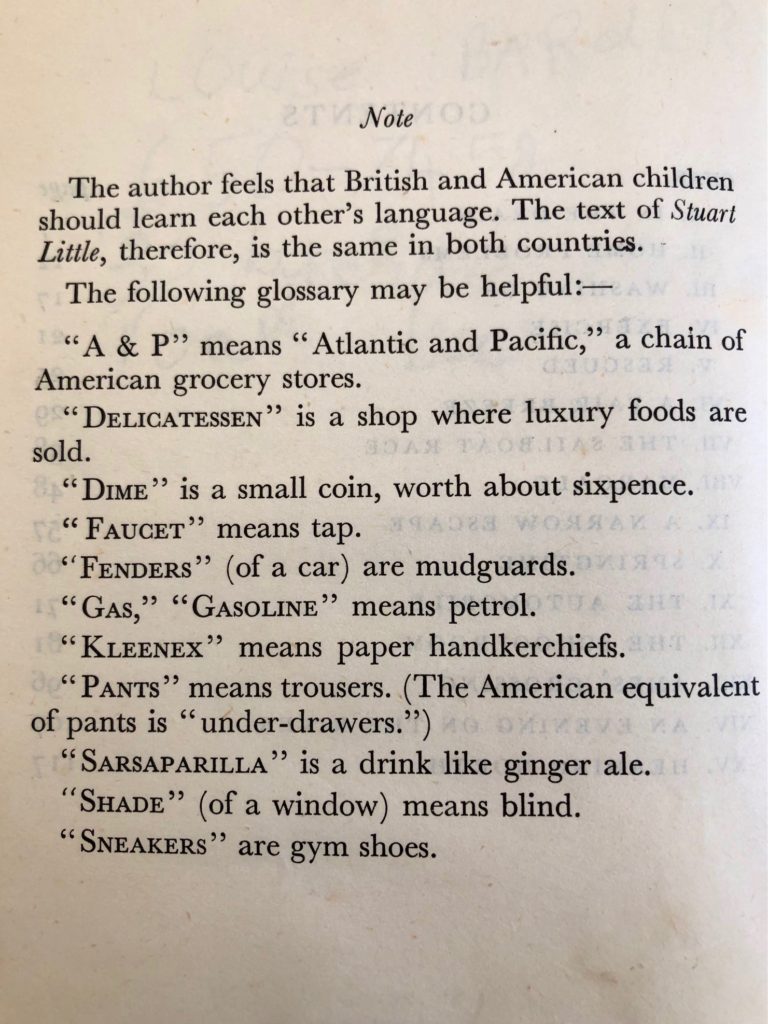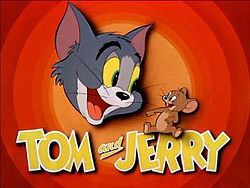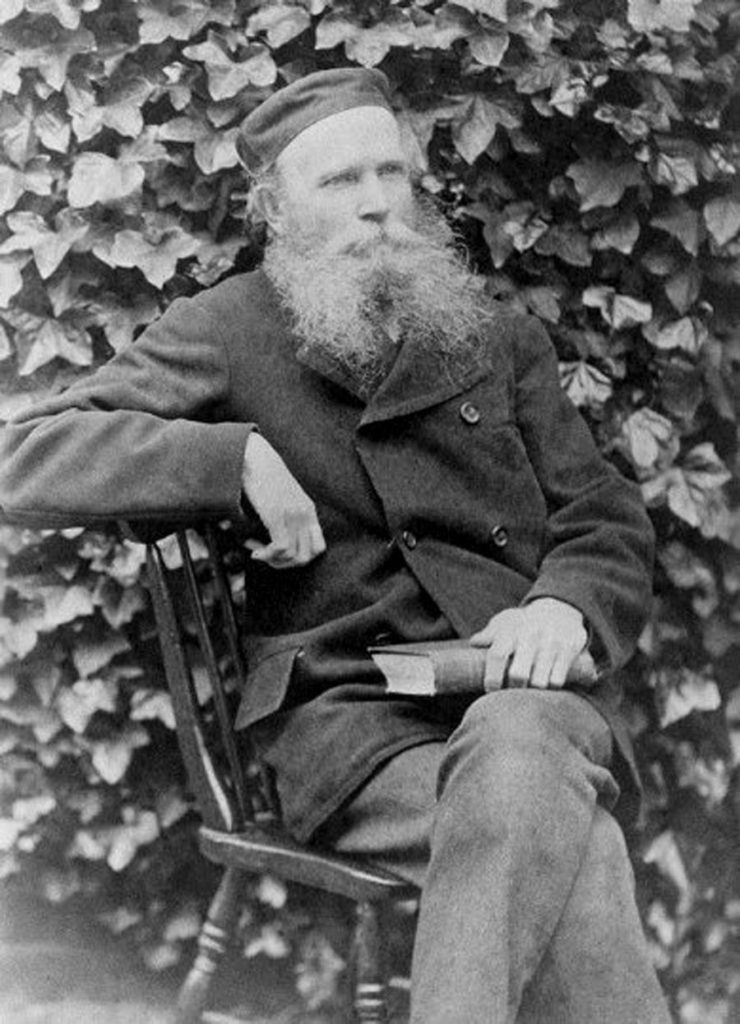
From my first edition (UK) copy of E. B. White’s Stuart Little, published in 1946.
* * * * *

An encore of Glosso’s short series of posts about “words with partners,” first published in March 2019, continues with a look at linguistic triplets.
They’re basically a triple-take on the Siamese twins discussed last week with the same identifying characteristics, i.e. three nouns, verbs or adjectives joined by and or or, and an immovable word order (“tears, sweat and blood” just doesn’t quite cut it). You’ll also see the comma splice in action here; you’ll know it when you see it. This “linguistic trinomial” (which I prefer to think of as a wordy ménage à trois) is a very good example of the powerful “rule of three” in speech and writing, which was covered in an earlier Glosso post, “Celebrating the rule of three.” Can you think of any more? Continue reading

Glosso is reposting a popular mini-series about “words with partners”.
The second* post of Glossophilia’s short series on “words with partners” looks at “conjoined words.” (When this post was first published just a few years ago the term commonly used was “Siamese twins”, but for hopefully obvious reasons this name has fallen out of favor.) In more formal linguistic terms we’re talking about “irreversible binomials”. Yeah, that sounds stuffy and boring, but these little binomials – of whom Tom and Jerry are a famous example – are fun when you get to know and understand them.
Continue readingReposting a popular mini-series about “words with partners.”
Today Glossophilia kicks off the first in a short series of posts about what we’re going to call “words with partners.” We’ll start by looking at words that are sometimes called “fossils” (although we think that’s something of a misnomer). These sad words are lost without their partners — i.e. they never seem to leave the house without their significant others. Continue reading

Yesterday we looked at phrases and expressions that use the names of towns and cities in the UK. Today we take a look at those citing places around the rest of the world – a few of which mention a certain Italian city …
A Bronx cheer: a sound of contempt or derision made by blowing through closed lips, usually with the tongue protruding (like the proverbial raspberry). Dating back to the early 20th century, the phrase probably originated at sporting events in the Bronx area (the northernmost borough of New York City), and it was first seen in print in the Bridgeport Telegram in a report by none other than Damon Runyon of a football game in October 1921.
Not for all the tea in China: not at any price (because China was known to produce tea in huge quantities).
A road to Damascus moment: when you have a great and sudden change in your ideas or beliefs. It comes from the famous occasion when Saint Paul converted to Christianity while he was heading to Damascus to persecute the Christians.
Something is rotten in the state of Denmark: used to describe corruption or a situation in which something is wrong. It’s a direct quote from Shakespeare’s Hamlet, said by Marcellus when he thinks something’s up because the ghost of Hamlet’s father has appeared several times.
Dunkirk spirit: what people draw on when they pull together to get through a difficult time. The phrase came into use following the evacuation of allied troops across the English Channel by flotillas of pleasure boats, working barges and other civilian craft at the Battle of Dunkirk in 1940.
Houston, we have a problem: used humorously to report any kind of problem. This is Hollywood’s version of what was radioed by the Apollo 13 moon mission to its command base in Houston after an oxygen tank explosion aboard the spacecraft in April 1970. Command module pilot John “Jack” Swigert called Houston after the little mishap, and his exact words were: “Okay, Houston, we’ve had a problem here.”
I’m from Missouri: you need proof, or you need to be shown, as in: “Show me: I’m from Missouri.” The phrase comes from Missouri’s nickname, “The Show Me State,” which it earned because of the devotion of its people to simple common sense. In 1899, Rep. Willard D. Vandiverr, a scholar, writer and lecturer with a passing resemblance to Mark Twain, was speaking to Philadelphia’s Five O’Clock Club. Questioning the accuracy of an earlier speaker’s remarks, he explained: “I come from a state that raises corn and cotton and cockleburs and Democrats, and frothy eloquence neither convinces nor satisfies me. I am from Missouri. You have got to show me.”
In a New York minute: very fast. ‘Cos everything happens quickly in the Big Apple. The phrase is said to have been coined in Texas in the late 1960s, when it was first claimed that a New Yorker does in an instant what a Texan would do in a whole minute.
A Philadelphia lawyer: a shrewd, astute, highly-skilled attorney (because back in the 18th century members of the Philadelphia bar were widely considered to be the best trained in the American colonies and exceptionally skilled in the law and rhetoric).
When in Rome … (or, more fully: “When in Rome, do as the Romans do): an advisory to follow the conventions of the area where you’re staying or visiting. The story goes that Saint Monica and her son, Saint Augustine, who both lived in Milan, planned to visit Rome, where they discovered that Saturday was observed as a fast day – unlike in their hometown, where it wasn’t. They consulted Saint Ambrose, who said: “When I am here (in Milan) I do not fast on Saturday, when in Rome I do fast on Saturday.”
Fiddling while Rome burns: occupying oneself with trivial matters and neglecting priorities during a crisis. Legend has it that while a fire was raging through the city of Rome, the emperor Nero played his lyre and even wrote a song about the fire’s destruction, showing utter neglect for his people and his empire.
All roads lead to Rome: a variety of means and methods will yield the same outcome. The phrase seems to be a modern reworking of a medieval expression. The 12th-century French theologian Alain deLille wrote “Mille viae ducunt homines per saecula Romam” (A thousand roads lead men forever to Rome) in Liber Parabolarum. Chaucer’s Treatise on the Astrolabe provides us with the earliest known English source: “Right as diverse pathes leden the folk the righte wey to Rome.” In about 300 BC, the Romans started building long straight roads that connected all the major cities with Rome but not with each other. This network of 29 roads connected 113 provinces of the empire, with Rome at its center. So it was true then that “all roads led to Rome.”
Rome wasn’t built in a day: you need plenty of time to create great things. It is the common English translation of a medieval French phrase, “Rome ne fu[t] pas faite toute en un jour”, found in the collection of proverbs Li Proverbe au Vilain published in about 1190. The expression really took off in the 16th century when John Heywood listed it (in English) in his A Dialogue Conteinyng the Nomber in Effect of all the Prouerbes in the Englishe Tongue (c. 1538), and Queen Elizabeth I referenced the expression in Latin in an address in Cambridge in 1563.
A Saigon moment: when people realize something has gone terribly wrong and they will lose or fail. The term presumably dates back to the capture of Saigon (also known as the fall of Saigon) by the People’s Army of Vietnam and the Viet Cong on 30 April 1975.
Stockholm syndrome: the tendency of a hostage to bond, identify or sympathize with his or her captor. The Swedish criminologist and psychiatrist Nils Bejerot originally coined the term to explain the aftermath of a bank robbery in Stockholm in 1973. The robber Jan-Erik Olsson took four bank employees hostage and remained with his accomplice, Oloffson, inside the bank with the four hostages during a six-day stand-off with police. After the hostages’ release, they were found to have developed strong emotional bonds with their captors. The hostages reported that Olsson and Oloffson treated them kindly and did not physically harm them. They defended their captors and refused to testify against them.
What happens in Vegas stays in Vegas: any scandalous activities that happen away from home shouldn’t be discussed with others afterwards. Or, more simply put, something needs to be kept secret. It originates from the official advertising slogan of Las Vegas (“What Happens Here, Stays Here”), a popular vacation destination with a reputation for hedonism. The slogan was first cooked up in 2003 at a brainstorming meeting in the Las Vegas tourism department of the ad agency R&R Partners.
Goodnight Vienna: it’s all over. It comes from the title of a romantic 1932 operetta, with book and lyrics by Eric Maschwitz and music by George Posford. According to Eric Partridge’s Dictionary of Catch Phrases: “As a [catch phrase] it has been described by Cyril Whelan, 1975, as ‘a pen-knife phrase, in that it can be put to a variety of different uses – often apparently contradictory. “If the officer catches us up to this, it’s Good Night, Vienna, for the lot of us.” … “So I met the girl. We had a few drinks. Back to her place, and Good Night, Vienna”.’ Its appeal and currency are due only to the fact that it’s mildly pleasing to the tongue in a racy sort of way and bounces quite happily on the ear of the listener.'”
* * * * *

A Glosso post five years ago – “Nationality (and very un-PC) expressions” – listed and described some common terms and expressions that incorporate names of countries and nationalities, drawing on proverbial and stereotypical national characteristics for comic effect. Some of these expressions were already considered derisive or downright offensive back in 2016 (and were labelled as such in the post), but probably just as many were thought to be benignly amusing if a little un-PC. Times have changed, and most of these phrases now come across as racist and offensive, so if you read the earlier post, please bear its original date in mind. It occurred to me recently that phrases including more specific place names (such as cities, towns or regions, and even some countries) don’t tend to carry the same derisive overtones, and if they do they’re fairly mild and inoffensive. Their origins are invariably as quirky and interesting as the expressions themselves. We’ll start with the British place names: please add any phrases I’ve missed to the comments section below. Tomorrow we’ll post phrases using non-British places (like when we’re in Rome …).
Put some English on it: hit or bat a ball in baseball, pool etc., giving it some curve or spin. The expression originated in billiards (which dates back to the 16th century: Shakespeare refers to it in Antony and Cleopatra), but in itself dates back to about 1823, when the introduction of a leather cue-tip allowed billiard players to make a side-spin. By 1860 the French were referring to this spin on a billiard ball as anglé, the French word for angled, which happens to be pronounced the same way as anglais, meaning English. As the word anglé took off and was used more broadly – not just in French – to describe this spin, it was duly translated into English to mean just that: English.
Close your eyes (or lie back) and think of England: to tolerate undesirable sex – usually on the part of a bored or tired spouse or lover. (It was first written in 1912 in the journal of Lady Hillingdon, but the phrase wasn’t necessarily coined by her.)
More front than Brighton: very self-confident, perhaps excessively so (because “more front than” historically denotes impudence or effrontery, and Brighton is known for its seafront – hence the ironic pun).
Ship-shape and Bristol fashion: in first-class condition (because Bristol’s harbor has one of the most variable tidal flows in the world and the water level can vary greatly between tides, with the result that ships moored there were beached at each low tide and had to be of sturdy construction and the goods in their holds needed to be securely stowed; the problem was resolved in 1803 with the construction of Bristol’s floating harbor).
Going at a Canterbury pace: at a dignified or stately pace. The word canter comes from pilgrims on horseback going at a ‘Canterbury pace’ along the Pilgrim’s Way to visit St Thomas à Becket’s shrine. The phrase was eventually shortened to the simple verb, to canter.
Grinning like a Cheshire cat: to grin broadly (and no-one knows why cats from Cheshire were said to grin, but the expression dates back to the mid-18th century, long before Alice in Wonderland – which featured literature’s most famous Cheshire cat – was written …).
To be sent to Coventry: to be deliberately ignored or ostracized (probably because of events in Coventry during the English Civil War in the 1640s, when Cromwell sent a group of Royalist soldiers to prison there and the locals, who were parliamentary supporters, shunned and refused to consort with them).
To carry coals to Newcastle: to undertake something that is both unnecessary and pointless (because Newcastle Upon Tyne was the UK’s first coal exporting port and has been well-known as a coal mining centre since the Middle Ages, so carrying coals there is a pointless activity – there being more than enough coal there already).
Getting off at Paisley: contraceptive practice of withdrawal/coitus interruptus (because Paisley is the penultimate train station when traveling from the Clyde coast back to Glasgow).
More non-British place-name expressions follow tomorrow.
* * * * *

Is “you guys” no longer appropriate to use in our more enlightened gender-neutral speech? It has an undeniably male “twang” to it, that’s for sure. But how do modern English-speakers – especially female and non-binary folks – respond to that catch-all term used to conveniently and informally address a group of people in the absence of a genderless second person plural in standard English (which German-, Turkish- and Gaelic-speakers, among others, are lucky enough to have in their linguistic toolkits)?
Continue reading
Continuing Glosso’s telling of the OED birth story…
Five years into the New Dictionary project, in 1884, James Murray and his family moved to a large house in north Oxford, where he built a second – larger – Scriptorium in his back garden, to store the growing mountain of paper slips that were flooding in for him and his team following his Appeal (see yesterday’s Glosso post). The Scriptorium, crafted from corrugated iron, was lined with wooden planks, book shelves and 1,029 pigeon-holes for the quotation slips. Anything addressed to ‘Mr Murray, Oxford’ would find its way to him, and the volume of mail sent by Murray and his team was so vast that the Post Office erected a special mailbox (or what the British call “postbox”) outside his house, which he had named ‘Sunnyside’. Among those slips of paper were some penned by a notorious murderer detained at the even more notorious Broadmoor.
Continue reading
If you haven’t already heard the story (which Glosso is about to tell you) of how the Oxford English Dictionary came to be, about the word-nerd man behind it, the role of the American public (who basically failed in their task – with one notable exception), and the even more extraordinary story of one of the dictionary’s most notorious and prolific contributors, you’ll probably think: “Oh wow, this should be made into a movie!” Well, sadly Mel Gibson beat you to it; like you, he’s good at spotting a juicy movie plot, but unlike you he’s got friends in the biz. Oh well: can’t win ’em all. Let’s hear the story of how one of the world’s oldest and most authoritative dictionaries came into being, using a kind of handwritten precursor to Wikipedia and depending on the good intentions of English-speaking readers around the world – including a schizophrenic murderous American surgeon who read a lot and knew a lot of words …
Continue readingIn honor of Elizabeth Windsor’s 95th birthday (it’s her real birthday today), Glossophilia is re-posting this piece about her name. Happy Birthday Elizabeth Alexandra Mary Windsor!